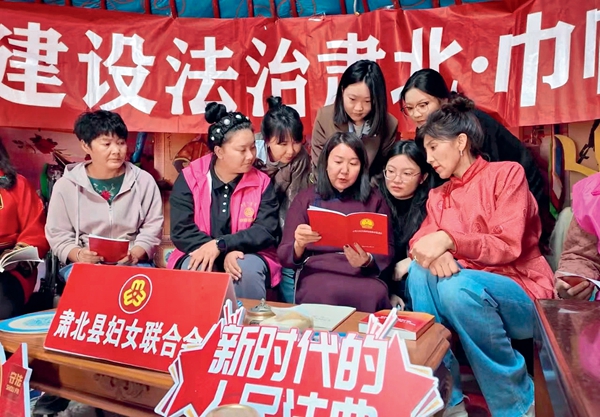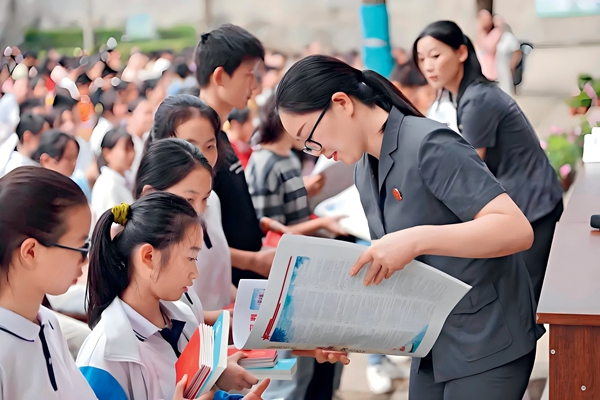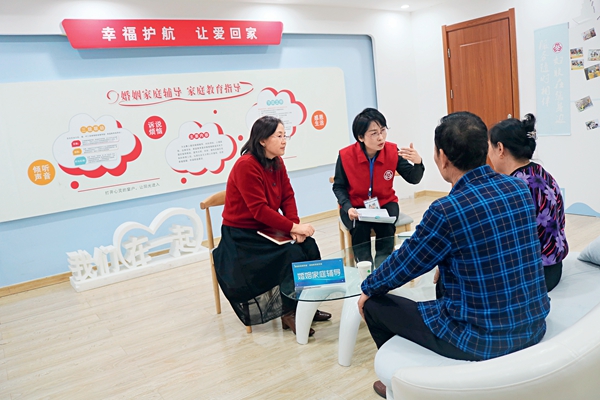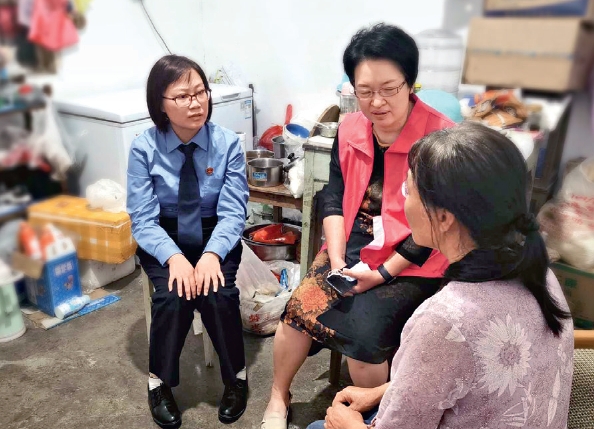Combating Domestic Violence, Fortifying Protection Network
Domestic violence, which infringes on the rights and interests of family members, undermines family harmony and affects social stability, must be opposed — unequivocally. Since the 18th National Congress of the Communist Party of China (CPC), in 2012, Xi Jinping, General Secretary of the CPC Central Committee, has attached great importance to fostering stronger family ties, values, and traditions. Xi has noted "family harmony contributes to social stability, family happiness fosters social peace, and family civility promotes social civility," and he has stressed the need to strengthen the legal safeguards for human rights.
The fifth session of the Standing Committee of the 14th National People's Congress held its first plenary meeting on August 28, 2023. Huang Xiaowei, Vice-Chairperson and Office Director of the National Working Committee on Children and Women under the State Council, was entrusted by the State Council to deliver a report on the efforts to combat domestic violence. Members of the Standing Committee affirmed the report, and the members said anti-domestic-violence work has achieved remarkable results. The members also stressed the need to improve supporting legal measures, strengthen implementation of relevant systems, and intensify coordination and comprehensive efforts to form a synergy to combat domestic violence.
For more than a year, all localities and relevant departments have implemented the Standing Committee's requirements, and they have promoted implementation of the laws and regulations on combating domestic violence.
 |
| Members of a publicity team, organized by the Women's Federation of Subei County (in Northwest China's Gansu Province), promote laws among women in a pastoral area. |
Comprehensive Publicity
Cultivating and establishing awareness of the rule of law is important in combating domestic violence.
At schools, the anti-domestic-violence seeds are planted in the hearts of children at a young age. The Ministry of Education has made anti-domestic violence an important part of schools' rule-of-law-education activities, to popularize knowledge of anti-domestic-violence laws.
"I remembered what the teacher said. Domestic violence is illegal," said one student. "It's wrong to beat children. We can tell the teachers and the police," added another student. The primary school students made the comments after participating in an anti-domestic-violence activity.
In cooperation with other departments, the Ministry of Education recently issued a work plan, addressing ways to improve the family-school-community-cooperative-education system, to help parents establish sound education concepts and improve education guidance and parent-child communications.
In March 2024, the All-China Women's Federation (ACWF), with the Office of the Central Cyberspace Affairs Commission and the ministries of Justice and Agriculture and Rural Affairs, launched the women's law-publicity tour in rural areas of China. The tour, which focused on promoting family civilization, preventing domestic violence and protecting the legitimate rights and interests of women and children, was well received by rural women.
"The publicity activity is very helpful, and we are clearer about the measures to punish domestic-violence perpetrators," said one woman. "I am fully aware we must use legal weapons to protect ourselves if we suffer domestic violence," said another. They made the comments after participating in a publicity activity.
As of December 2024, 1.69 million law-publicity lectures and cultural activities, on the rule of law, have been held in 420,000 villages across the country. In addition, more than 100 million people have participated in interactions, either online or offline. The activities have injected new vitality into efforts to strengthen the rule of law in rural China.
 |
| Judges distribute law-publicity materials to students in Xiangtan, a city in Central China's Hunan Province. |
Effective, Targeted Prevention
Marriage and family disputes, if left unresolved, can trigger intense conflicts, even domestic violence.
In September 2024, a middle-aged couple entered a marriage-registration office, in a civil affairs bureau, in Shijiazhuang, a city in North China's Hebei Province. They had been quarreling, and they wanted a divorce. Liang Shufang, who had been named an excellent mediator in Hebei, invited the couple into a mediation room. The wife, surnamed Yang, complained her husband, surnamed Liu, often ignored her years-long contributions to the family. As a result, they often quarreled.
Liang offered the couple psychological counseling, and she worked, patiently for three hours, to mediate their problems. Thanks to Liang's efforts, Liu finally acknowledged his fault, and he apologized to his wife. "Your mediation was really helpful. I feel much better now," Yang told Liang.
 |
| Mediators in East China's Shandong Province help mediate a couple's marriage-related problems. |
Liang was one of the thousands of Most Beautiful Domestic-Affairs Mediators selected by women's federations, at all levels, across China. In recent years, ACWF has worked with the Commission for Political and Legal Affairs of the CPC Central Committee, to strengthen guidance over localities, to promote establishment of a diverse mediation-service model featuring cooperation between women's federations and other agencies, to develop the Most Beautiful Domestic-Affairs Mediators brand, and to advance social security, by addressing marriage and family disputes.
To date, approximately 100,000 people have worked, either full-time or part-time, as marriage and family mediators in China. Since 2023, they have mediated more than 300,000 family disputes, and their success rate exceeds 90 percent.
Marriage registration is a requirement for all couples seeking to wed. Counseling rooms have been set up in more than 90 percent of marriage-registration agencies, at and above the county level, across China. The Ministry of Civil Affairs has guided localities in taking measures, including implementing venture-philanthropy programs, offering expenditure subsidies, and leveraging government procurement of public services, to provide pre-marriage counseling and marriage-dispute-mediation services at marriage-registration agencies. These efforts have been conducive to reducing family disputes, by addressing the root causes of conflicts.
 |
| Policewomen in Huaibei, a city in East China's Anhui Province, promote legal information among women during "anti-domestic-violence publicity week." |
Efficient, Standardized Response
Handing domestic-violence cases in accordance with the law is the most powerful strike against domestic violence. One day, in April 2024, a resident, surnamed Wang, in Northwest China's Shaanxi Province, suffered domestic violence at the hands of her husband, surnamed Zhu. Wang turned to the police for help. The police arrived at Wang and Zhu's house, criticized Zhu, outlined anti-domestic-violence laws, and issued an admonition notice to Zhu, to warn him of his behavior.
The admonition system is a precautionary measure to stop and prevent domestic violence. In December 2024, guidelines on strengthening implementation of the admonition system to combat domestic violence, were issued by nine institutions, including the Ministry of Public Security, the Commission for Political and Legal Affairs of the CPC Central Committee, the Supreme People's Court, the National Working Committee on Children and Women under the State Council, and the ACWF.
The guidelines, a State-level document aimed at promoting the admonition system to combat domestic violence, clarified the procedures and work requirements for issuing the admonition notice, to ensure the admonition system is better implemented in localities.
On July 31, 2024, a woman, surnamed Chen, from Southwest China's Chongqing Municipality, suffered an injury during violence at the hands of her ex-husband. The local court responded in a timely manner; the court opened a "green channel" to place Chen's case on file, helped Chen apply for a personal safety protection order, and issued the order — all within one hour.
Chen's case was one example of how people's courts expedite issuance of personal safety protection orders to address domestic violence. Courts across China issue such orders to effectively prevent the occurrence or reoccurrence of domestic violence.
Procuratorial agencies, while handling domestic-violence cases involving minors, stepped up efforts to examine implementation of the mandatory reporting system.
During the first half of 2024, many people and/or institutions were held accountable for failing to report crimes against minors, and procuratorial proposals were issued by procuratorial agencies to the people and/or institutions involved.
 |
| A procurator and a women's federation cadre visit a woman, a recipient of judicial assistance, in Xianju, a county in East China's Zhejiang Province. |
Heartwarming Assistance
Punishment of domestic-violence perpetrators reflects the authority of laws. Timely assistance to domestic-violence victims showcases the concern and warmth of society.
Shelters help domestic-violence victims escape harm and/or the threat of violence. The Ministry of Civil Affairs has guided localities in building domestic-violence shelters. To date, 1,567 social-assistance agencies nationwide have established domestic-violence shelters or rooms. There, victims receive various services, including temporary accommodations, medical treatment, psychological therapy and legal aid.
A woman, surnamed Xiong, in Putuo District, in East China's Shanghai Municipality, was punched, for no reason, by her husband when he was drunk. Putuo Women's Federation transferred clues, which supported Xiong's efforts to sue her husband, to Putuo People's Procuratorate. The federation also provided clues that supported Xiong's application for judicial assistance.
The procuratorate immediately dealt with the case, based on relevant judicial procedures, and decided to grant the funding of judicial assistance to Xiong and her daughter. The procuratorate also worked with other bodies, including the district's women's federation, the civil affairs and public security departments, the local Communist Youth League committee and subdistrict's office to provide other assistance to Xiong. To express their gratitude, Xiong and her daughter have twice sent special pennants to Putuo People's Procuratorate.
During the past two years, ACWF and the Supreme People's Procuratorate have conducted a campaign aimed at strengthening special judicial assistance to in-need women. They have issued a combined 760 million yuan (US $107 million) in assistance funding to 70,000 women.
In April 2024, the Ministry of Justice launched a campaign aimed at satisfying minors' needs for legal aid. The legal-aid law stipulates a domestic-violence victim may apply for legal aid, even if he/she is not facing financial hardship. The campaign ensures whole-process, legal-aid services are available to minors. It is intended to help minors walk out of the shadow of domestic violence, and grow up healthily.
The fight against domestic violence requires dedicated efforts. On the new journey, all relevant departments will enhance enforcement of the anti-domestic-violence law, and they will continue combating domestic violence, with a zero-tolerance stance, through concrete actions.
Sources: ACWF Legal Department and Women Voice
(Women of China English Monthly December 2024)
Editor: Wang Shasha
Please understand that womenofchina.cn,a non-profit, information-communication website, cannot reach every writer before using articles and images. For copyright issues, please contact us by emailing: website@womenofchina.cn. The articles published and opinions expressed on this website represent the opinions of writers and are not necessarily shared by womenofchina.cn.








.jpg)

 WeChat
WeChat Weibo
Weibo 京公网安备 11010102004314号
京公网安备 11010102004314号